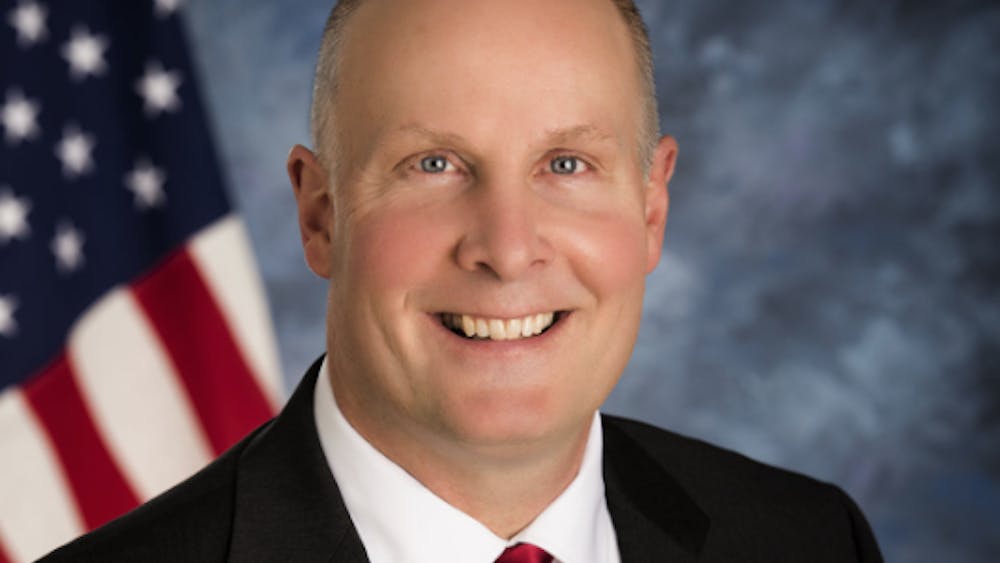'Their legacy will live on'

Lieutenant Colonel Leonard Rusher answers questions from the audience during Valor and Resilience: The Legacy of Black Veterans Monday, Feb. 12 in the Sarah and Daniel Opperman Auditorium. When asked what advice he would give to a Black individual considering the military, Rusher said the military can provide people with numerous opportunities. "It will provide you a foundation on your personal life and on your professional life," Rusher said. (CM-Life | Ella Miller)
Lieutenant Colonel Leonard Rusher, a veteran with over 30 years of experience working in service, talked about the obstacles and challenges as well as the honors and successes Black veterans faced while serving for the United States.
Madison Coleman, a junior at Central Michigan University and active member of the Michigan Army National Guard, hosted Valor and Resilience: The Legacy of Black Veterans event on Feb. 12, where Rusher also spoke.
Coleman talked about the centuries of Black veteran’s history in a presentation, starting in the 1700s highlighting many battles and notable figures such as Crispus Attucks and Black soldiers' roles in the revolutionary war.
Moving through the 1800s Coleman spoke about the often overlooked stories of Black soldiers during the War of 1812, the Civil War and the Spanish-American War.
The 20th century discussion highlighted many of the evolving roles and opportunities for Black soldiers such as the first Black pilot, the first Black marine general and the first Black chief nurse.
Moving on to the modern day, Coleman discussed how the Army continues to strive towards diversity and equal opportunity for all of its service members.
According to Coleman, while 12.7% of the general United States population is Black, they make up 20.3% of the army.
“This trend was since observed since the late 20th century, and it still continues today showcasing ongoing demographic representation,” she said.
Near the end of her presentation, Coleman restated that the history she provided only scratched the surface of the many contributions and sacrifices made by Black veterans.
“This is just a piece of the huge long line of history of Black soldiers and soldiers in general that I showed you,” Coleman said.
The presentation concluded with a brief moment of silence for all veterans who had passed away in the line of duty.
“Their courage, valor and sacrifice will never be forgotten," Coleman said. "And we are forever indebted to them for the service in their memory. May we always remember and honor the brave men and women who have given their lives in service to our country, their legacy will live on in our hearts.”

Junior Madison speaks about her unit during Valor and Resilience: The Legacy of Black Veterans Monday, Feb. 12 in the Sarah and Daniel Opperman Auditorium. The question asked audience members which unit in the 1-182nd Coleman is a part of, with the correct answer being HHB. (CM-Life | Ella Miller)
Rusher also talked at the event. He started his military service at 17 years old in 1982, where he started off as a private and worked his way to the rank of Lieutenant Colonel.
Being a Black service member, Rusher said he had faced both positive and challenging aspects during his services, citing instances where opportunities were either granted or denied based on the color of his skin.
However, despite the hurdles, Rusher said his experiences serving were overall phenomenal due to the many people he met and achievements he made.
“I would tell almost anyone–give the military an opportunity,” he said. “It will provide you so many opportunities. I can't even name all the things that it allowed me to do. It allowed me to take care of my family, to have my kids be exposed to so much that very few that had the opportunity to be exposed to…”
Coleman also acknowledged Black service members and their contributions and sacrifices to the nation.
“They remind us that diversity is not merely a buzzword, but a source of strength that enriches our military institutions and enhances our collective capabilities,” she said. “By honoring Black history … we not only pay homage to the countless lives lost and the countless battles won, but we also reaffirm our commitment to upholding the ideals of equality, justice and freedom.”



